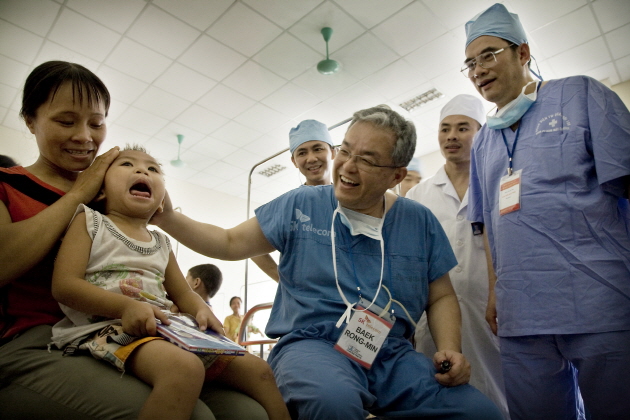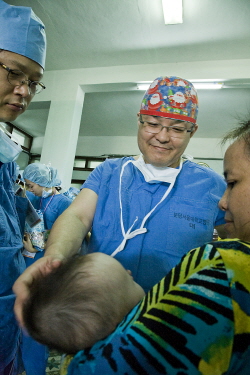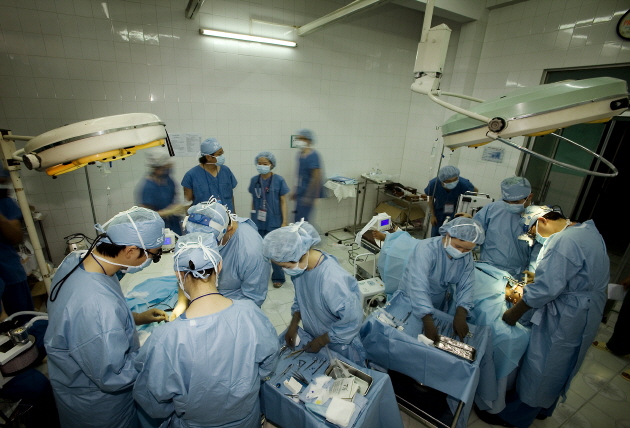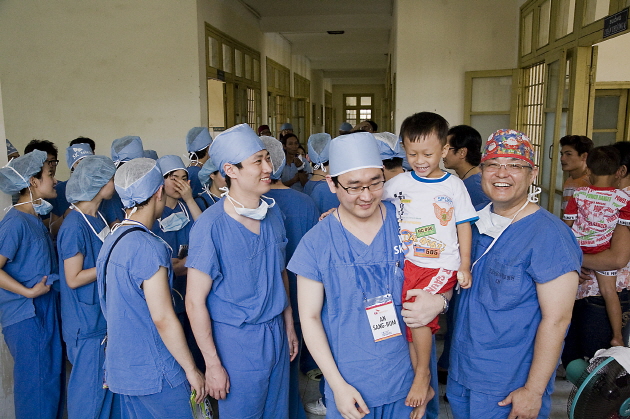
Interview with Professor BAEK Rong-Min at SNU Bundang Hospital who has given free surgeries to 3,000 of Vietnam children with facial deformities
Surgery is a strenuous act that requires extreme physical and mental strength even in the best facilities and infrastructure. How hard must it be, then, to perform surgeries all day, in the intolerable heat of 40 degrees Celsius and inadequate lighting due to a lack of sufficient electricalpower. The fact that someone has successfully completed this task for 16 years straight is an unbelievable. That someone is Professor BAEK Rong Min, the deputy director in SNU Hospital Bundang Branch. As always, Professor Baek will be travelling to Vietnam to do medical volunteer work. The number of patients Professor Baek has treated so far has reached 2,907 last year, and after this year the number will surpass three thousand. Professor Baek treated his patients for congenital cleft lips (a lip splitting disease), cleft palates and other patients suffering fromfacial deformities.
Q. You’re going through the hardship again this year. Why do you put yourself through this every year? Are you going this year as well?
A. Of course I’m going this year. 95% of the patients that are waiting for me are children. When I think of their sparkling eyes, I can’t skip even a year.
 Q. When are you leaving?
Q. When are you leaving?
A. I usually leave around June, but because of the situation in Vietnam this year, I had to postpone the trip.
Q. Is the length of the trip the same as usual?
A. Yes, the whole trip is ten days and I’ll be treating the patients for seven days.
Q. The number of patients you treated must be huge
A. I’ve starting doing this in 1996, and it reached 2907 last year. Every time I visit, I treat around two hundred patients, so it will be over three thousand this year.
Q. I’ve heard that it is a Korean record for most surgeries abroad?
A. (With an apologetic expression) I’ve never thought about it, the numbers don’t really mean much.
Q. I can’t quite understand how this kind of record is even possible!
A. It’s because I’ve started early and kept going at it for a long time without any breaks. The fact that we established an efficient system and invested a lot of equipment and personnel in order to do surgeries for a large number of patients helped. We’ve managed to do many surgeries from the very start.
Q. How many times have you been there?
A. As I’ve gone every year, it will be the 16th time this year.
Q. What region will you be visiting this year?
A. The local partners in Vietnam, the Vietnam’s Defense Ministry, usually decides, but the location has not been decided yet. I have heard vaguely that it will be in the Southern region this year.
Q. How many Vietnamese provinces have you been to?
A. I’ve been to Hanoi twice. All the other times we went to different 성s. So I’ve been to a total of 14 so far.
Q. You’ve said that you want to go to all 59provinces; I guess you need to keep going until you become ‘old and grey’
A. That’s the goal. If for whatever reason I’m not able to go, I am certain that those who are accompanying me will carry on my legacy without me. I have complete faithin them.

A. We need a lot of equipment because we need to do cleft lip and palate surgeries over there. The equipment needed is limitless: from anesthetic equipment and anesthesia, to surgical knives, sutures, sterilizers, infusion solution, antibiotics etc. It’s pretty much the equivalent of constructing a local field hospital. The equipment is for two hundred patients, so we need to fill up a whole container cargo box and send it by airplane. We have to hand-carry any fragile equipment as well.
Q. When do you send the equipment?
A. It only takes one day to get there, but there is the customs procedure and we have to transport the equipment to the countryside, so we send the all the equipment about a month and a half beforehand.
Q. Setting up the equipment locally must also be a daunting task
A. It is indeed a difficult task. It is a large-scale task. Around 30 to 40 doctors, nurses and volunteers take out the equipment and set six surgical tables in three rooms (two tables for each room). It takes two hours to set it all up. It takes so long because everyone participating are all used to doing surgery where everything is already set up for them and nobody has any experience setting up the tables. The first time we sent it took us the whole day to set the tables up. It is quite burdensome.
Q. The volunteers complain a lot because of the impossible conditions in Vietnam.
A. We need to travel to the location by bus for 6 hours in the scorching heat that easily goes over 40 degrees Celsius. Some of my crew, including myself even pass out sometimes due to the heat. Selecting buses that are equipped with air-conditioning is, of course, impossible. We ride with what we get. It’s all down to luck, really. Many of the roads are dirt roads. The electricity supply isn’t any good so it’s quite common to be in surgery with dim lights. There are times when the air-conditioning won’t work in the surgery room. It is definitely not easy fighting through the heat and the dark. There are even hospitals that resort to acupuncture because they don’t have the capabilities of providing full body anesthesia. That is why we have to send the anesthesia by airplane.
Q. I heard that you were frustrated because the Vietnamese patients wouldn’t gather?
A. Most facial deformation patients hardly go outside and stay hidden in their homes. So even if there is a statistical estimate of the number of patients, we never know their exact location. Unfortunately, the patients were not aware that we were trying to help them. Although the situation is gradually getting better, it is still a big problem.
Q. I’ve heard that the surgeries are likened to manufacturing products in a factory so as to enhance efficiency.
A. The Vietnam Central Hospital’s Army surgeon and the local hospital doctors check the patients before the surgery. They see what diseases they are suffering from and whether they have any conditions like diarrhea and the flu that will be a problem for the surgery. They also conduct the tests required for the surgery. They hospitalize the 200 patients and make them wait in the hospital all at once. This allows us to go into surgery immediately, but it is also the only option as there aren’t any adequate places for the patients to stay and they don’t have the money to pay for accommodation. When everything is ready, then I arrive with my team and as soon as we get there we fully operate the six tables and go around in turns to look at the patients. During the surgeries, the local Army surgeons and doctors participate in two of the six tables. We have to teach them how to catch a fish instead of just giving them fish. We need to show them how to do the surgery, so they can do the surgeries on their own in the future.
Q. Isn’t the schedule to tough?
A. We start at 8 AM and keep going in circles except for a quick break for dinner at 7 PM. If the surgeries take long, we keep going until 10 PM.
Q. Do the local doctors pick up the surgeries quickly?
A. The Vietnamese cast of mind is very similar to the Koreans’. They are very diligent, passionate about learning, and very smart. The Army surgeons are especially skilled as many of them have participated with us a few times.
Q. Why do you leave all the equipment in Vietnam?
A. Even if we teach the local doctors how to do the surgeries during our time here, if they don’t have the equipment, there is nothing they can do. That is why we donate the equipment every time we visit. What good is knowing how to fish if they don’t have a fishing rod?
Q. I’ve heard that the Vietnames doctors are learning in SNU Bundang Hospital.
A. Ever since 1998, we have been giving six month to 1 year opportunities to selected Vietnamese plastic surgeons. So far 7 people have come and one the first fellow, Doctor Ahn from the Army’s Central Hospital was the same ages as me, so we were very close.
Q. What is the most important point in surgery?
A. First is safety. We treat a lot of patients in a short period of time;there are even 3 month old new born babies. The fact that we do full body anesthesia is a safety hazard in some ways so we need to take particular care in that aspect. The next thing is that we get the best result possible. This is because the patients that receive surgery this time will probably never get a chance to receive additional surgery. That is why we have to try much harder than we do at Seoul.
Q. Some patients climb over mountains and cross rivers to get there.
A. Even if the distance itself isn’t that great, the traffic is horrible so it’s hard to reach the hospitals. There are a lot of patients that take tiring two days to get here, traveling on horses then cars then ferries.
Q. I’ve heard that every time you visit Vietnam, the state broadcast station VTV follows you
A. They always come to do interviews and broadcast about us.
Q. Do the people who accompany you change every time?
A. Yes they differ. Of course, there are the five or six ‘fundamental partners’ that accompany me ever time (laughter). Among doctors the key members are plastic surgeons Ha Dong Ho, YounIhnDae, who have their own practices. They close down their own practices and come with me, which is very hard to understand in my point of view. They look like people who have abandoned their livelihoods. Members of the Smile for Children Organizationand SNU medical students participate to volunteer and they do the grunt work like cleaning the equipment and preparing the patients for surgery. Even if the work is gruesome, they all work with a smile. They truly are the possessors of passionate hearts.
Q. It is probably not easy to assemble so many people.
A. When we began, it was difficult. That’s why I hard to pressure or pretty much force my close professors or my juniorattendings and residents. However, once they are caught in my trap and visit Vietnam, their minds change completely. They fully appreciate the bliss of volunteer work. Recently, there are some people who accompanied me 10 years ago who come to me and say that they want to go again this year. We’ve been doing medical volunteer work for a long time and people’s impressions of us have changed as well.
Q. I’ve heard that the foreign medical volunteer work originated from the volunteer activities in Korea first.
In the 1980s,when I first starting practicing medicine in InjeUniversity Paik Hospital, people did not have a lot of money. Even when people knew that surgeries for facial deformation were effective and doctors recommended it, not many people were able to afford the surgery. They simply didn’t have enough money. My older brother, BaekSeh Min, who was a plastic surgeon at InjeUniversity Paik Hospital at the time, was fully aware of the problem at the time and shared my concerns. Then one day, in 1989, my older brother asked me to perform surgeries pro-bono, and I gladly accepted his request. That is when I started to do free surgeries for volunteer work, along with my brother and other acquainted professors. We all chipped in to cover the costs, and we had to ask our friends to help us. We requested the help of the regional education offices and local public health centers to locate the patients. We used our off-days, the weekends, to go to the country. We did surgeries for patients in the assembly hall of the regional education offices or local public health centers. When the number of patients we cared for surpassed 500, the problem of getting sustainable financial resources needed to be solved. That’s why I made the Smile for Children Organization in 1995. At first, my older brother assumed the presidency, and then I was president. The organization currently sponsors over 4600 patients.
Q. How did you get to go to Vietnam?
A. I made an incorporated body and had a lot of supporters. As the financial situation got better, I started to get the idea of helping other poorer countries. That is when I thought of Vietnam. In 1992 the two nations reestablished diplomatic relations again, so the mutual exchanges were meaningful.
Q. I would imagine that the Socialist companies would hate this kind of help.
A. I asked the current the Vice-Minister of Foreign AffairsDoan Xuan Hung who was the first Vietnamese Ambassador in Korea and I got an unexpectedly warm response. If you’re going to do this kind of thing, you need a stable and trustworthy partner, and he obligingly linked me up with the Vietnamese Defense Ministry. I always meet him whenever I go to Hanoi.
Q. When you first started the overseas volunteer work, e-mailing wasn’t invented, did you have any problem contacting the people in Vietnam?
A. Even the fax would get disconnected all the time, so we had to communicate by hand-written mail. These letters would take 10 days to get there. It would take even longer to get a reply! It would be easier to understand if I told you that the preparation took 6 months back then.
Q. I have heard that you have started doing volunteer work in Mongolia and Uzbekistan as well.
A. SNU Hospital started doing medical exchange with Uzbekistan in 2002, and as a part of that exchange, me and the SNU hospital team did some medical volunteer work over there in 2003, 2004 and 2005. Mongolia, we promoted helping children with facial deformation as part of the bilateral rotary exchange processes. It took an excessive amount of time to move the surgical equipment to Ulaanbaatar because of the vast territory of Mongolia. So we decided that it would be easier to do the surgeries in Seoul and started inviting six people a year since 2006.
Q. I am guessing that there will be some patients that you met during your medical volunteer work, you could never forget.
A. You remember the parents more than the children. It is obvious I love the children, but the mothers cry a lot. They shed tears of happiness. That is what parents are like.
Q. I have heard that you can’t treat many Mongolia children because of the Visa problem.
A. Even in Korea, it is not easy for a person living in the countryside to receive a passport Visa. It is the same in Mongolia, because it is a developing country. We have someone who helps us with the procedure but they can’t be doing this for us all the time.
Q. Do you have any plans to help North Korea?
A. In 2002, I visited Pyung Yang and suggested to the authorities of this work. But then, the West Sea Battle broke out, where North Koreans attacked South Koreans. Then I went to Gae Sung and Pyung Yang in 2009, explained what I wanted to do again, and we nearly made an agreement but the North Koreans torpedoed the CheonAhn Corvette. Some of the members of our organization even joked that we should stop visiting North Korea for the sake of inter Korean relations.
Q. Why is facial deformation such a problem in developing countries?
A. Performing surgeries for facial deformation is an incredibly technically difficult surgery. It is a surgery that only countries with developed economies can perform. Developing countries who need to concentrate on other areas have no room to invest in facial deformation.

A. It costs around 120 million KRW every time we go to Vietnam. Two thirds of that is spent on Equipment. As we leave all the equipment over there, we need to get new ones every time. Then the flight tickets cost a lot. The staying costs are kept to a minimum as we eat the hospital food and we sleep at the government owned guesthouse. But that too, is not a small figure, because we have so many people volunteering. Most of the Vietnam budget is funded by SK Telecom. There are also many other companies that sponsor our organization. I can only thank the people and corporations that fund us. What is more important than funding, is those who sacrifice their time and effort to volunteer. Also, SNU Hospital Bundang Branch urges us to go, even if there will be a shortage of personnel if the doctors are absent.
Q. Were there any times that you needed money?
A. It was really hard during the IMF crisis. Everybody was suffering so the funds decreased. There was, however, some priceless experience. I was afraid that SK telecom, which was funding our Vietnam efforts at the time, would be doubtful about helping us. They gladly helped us, though, saying “If a big company like us is going through hard times, how harder must it be for individuals and the patients in Vietnam.”
Q. You received awards from HankookIlbo in 2008 and the Red Cross in 2009 for your volunteer.
A. It is really quite embarrassing. I have actually declined a government award from Vietnam because of the embarrassment.
Q. What do you feel about people calling you the Korean Schweitzer?
A. Schweitzer would not be too happy about that.
Q. You have a lot of ambition, I think there are a lot of things that you want to do.
A. As long as I am alive, I want to continue with my work of sharing love around the world. It is the mission the heavens have endowed me with and there is no retiring from that.
Written by YU Minseok, SNU English Editor, brits@snu.ac.kr ?
Reviewed by Eli Park Sorensen, SNU Professor of Liberal Studies
Proofread by Brett Johnson, SNU English Editor

